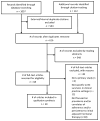Adherence to adjuvant hormonal therapy among breast cancer survivors in clinical practice: a systematic review
- PMID: 22689091
- PMCID: PMC3607286
- DOI: 10.1007/s10549-012-2114-5
Adherence to adjuvant hormonal therapy among breast cancer survivors in clinical practice: a systematic review
Abstract
Adjuvant hormonal therapy significantly improves long-term survival of breast cancer patients with hormone receptor-positive disease. Despite the proven clinical efficacy of tamoxifen and aromatase inhibitors, many breast cancer survivors either fail to take the correct dosage at the prescribed frequency (adherence) or discontinue therapy (persistence). This systematic review aims to: (1) determine the prevalence of adherence and persistence to adjuvant hormonal therapy among breast cancer survivors in clinical practice, and (2) identify correlates of adherence and persistence. We searched Medline, PubMed, PsycINFO, and CINAHL for studies that measured rates and/or correlates of adherence and/or persistence to adjuvant hormonal therapy. Studies were reviewed in a multi-step process: (1) the lead author screened titles and abstracts of all potentially eligible studies; (2) each coauthor reviewed a random 5 % sample of abstracts; and (3) two sets of coauthors each reviewed half of all "maybe" abstracts. Any disagreements were discussed until consensus was reached. Twenty-nine studies met inclusion criteria. Prevalence of adherence ranged from 41 to 72 % and discontinuation (i.e., nonpersistence) ranged from 31 to 73 %, measured at the end of 5 years of treatment. Extremes of age (older or younger), increasing out-of-pocket costs, follow-up care with a general practitioner (vs. oncologist), higher CYP2D6 activity, switching from one form of therapy to another, and treatment side effects were negatively associated with adherence and/or persistence. Taking more medications at baseline, referral to an oncologist, and earlier year at diagnosis were positively associated with adherence and/or persistence. Adherence and persistence to adjuvant hormonal therapy among breast cancer survivors is suboptimal. Many of the correlates of adherence and persistence studied to date are not modifiable. Our review reveals a critical need for further research on modifiable factors associated with adherence to adjuvant hormonal therapy, and the development of behavioral interventions to improve adherence in this population.
Conflict of interest statement
The authors declare that they have no conflicts of interest.
Figures
Comment in
-
A meta-regression analysis of the available data on adherence to adjuvant hormonal therapy in breast cancer: summarizing the data for clinicians.Breast Cancer Res Treat. 2013 Feb;138(1):325-8. doi: 10.1007/s10549-013-2422-4. Epub 2013 Feb 12. Breast Cancer Res Treat. 2013. PMID: 23400580 No abstract available.
References
-
- Fisher B, Dignam J, Bryant J, DeCillis A, Wickerham DL, Wolmark N, Costantino J, Redmond C, Fisher ER, Bowman DM, Deschenes L, Dimitrov NV, Margolese RG, Robidoux A, Shibata H, Terz J, Paterson AH, Feldman MI, Farrar W, Evans J, Lickley HL. Five versus more than five years of tamoxifen therapy for breast cancer patients with negative lymph nodes and estrogen receptor-positive tumors. J Natl Cancer Inst. 1996;88:1529–1542. - PubMed
-
- Goss PE, Ingle JN, Martino S, Robert NJ, Muss HB, Piccart MJ, Castiglione M, Tu D, Shepherd LE, Pritchard KI, Livingston RB, Davidson NE, Norton L, Perez EA, Abrams JS, Therasse P, Palmer MJ, Pater JL. A randomized trial of letrozole in postmenopausal women after five years of tamoxifen therapy for early-stage breast cancer. N Eng J Med. 2003;349:1793–1802. - PubMed
-
- Coombes RC, Hall E, Gibson LJ, Paridaens R, Jassem J, Delozier T, Jones SE, Alvarez I, Bertelli G, Ortmann O, Coates AS, Bajetta E, Dodwell D, Coleman RE, Fallowfield LJ, Mickiewicz E, Andersen J, Lonning PE, Cocconi G, Stewart A, Stuart N, Snowdon CF, Carpentieri M, Massimini G, Bliss JM Intergroup Exemestane Study . A randomized trial of exemestane after two or three years of tamoxifen therapy in postmenopausal women with primary breast cancer. N Engl J Med. 2004;350:1081–1092. - PubMed
Publication types
MeSH terms
Substances
Grants and funding
LinkOut - more resources
Full Text Sources
Medical
Miscellaneous


